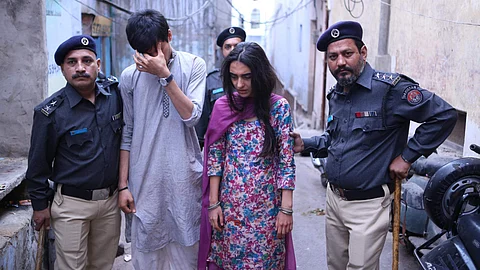Bi-Weekly Binge: Iram Haq’s What Will People Say takes on a familiar fear
In Iram Haq's Norwegian-Urdu film What Will People Say (Hva vil folk si), languages intermingle with a kind of free will not allowed for women in the protagonist's household in Oslo. The first frames of the film have Mirza (Adil Hussain) going room by room in his house switching off the lights, presumably a daily bedtime routine for him, and Nisha (Maria Mozhdah), Mirza's 16-year-old daughter, running to reach her house; her friends and a promise of a different life disappearing behind her. It is the kind of scampering Nisha would be put through for a large part of the film, running between her life as a teenage girl in Norway and that of the demure mild-mannered Pakistani woman living with her conservative parents. Her indulgences at home are, at the most, being lost into her smartphone, but outside, she drinks, goes clubbing with her friends, and probably has a boyfriend. But when there is a call from home or the curfew needs to be kept, she is running again.
A Romeo-Juliet inspired misdemeanour is short-lived and gives way to a minor kerfuffle involving Nisha, the Romeo and Mirza. The lights go out by themselves in Mirza's heart, as they do in those of other family members. An ephemeral bit of good fortune lands Nisha in Child Welfare and the mediation begins. The seriousness and effect of her transgression—in Nisha's case it could be qualified with a 'so-called'—dawns on her much later, when she leaves the protective hold of Child Welfare after a warm phone call with her mother. A cold car ride, a father escorting his fully-grown daughter through the airport with only handcuffs missing, another couple of hours on muddy roads later, Mirza and Nisha arrive at his ancestral village in Quetta, Pakistan. From the cold, bleak, mountainous Norway, Nisha is put on house arrest at her aunt and uncle's place in dry, sun-kissed Pakistan with sporadic electricity.
This plot detail, of the parents effectively kidnapping their daughter and sending her to Pakistan, is something Iram Haq personally went through, making What Will People Say mostly autobiographical. Nisha is torn between two lands—the humid, unrelenting heat of Pakistan and the cold, loveless Norway—that, now, resent her in equal measure. All of it thanks to one single rhetorical question in various forms: What will the relatives think, what will society do, what will people say?
Haq gives us stray information in throwaway scenes, like how Nisha's mother Najma (Ekavali Khanna) met Mirza only on the day of their wedding, or how since the time of the events, the Mirza family hasn't been receiving wedding invitations. In these portions, Haq treads on dangerous territory. She risks depicting the east, that too Islam and Pakistan, as some sort of savage civilizations, while the West promises Nisha better life, security. But Haq does something intelligent with the Pakistan leg. Nisha meets a cousin, Amir, as young and as floating in adolescence as Nisha herself. They strike up a brief affair that is more sexual exploration than romance. Earlier we see Mirza and his friends blaming the culture of Norway, the circle of friends Nisha keeps as the cause for her straying from the path her family has envisioned. And that living in Pakistan with her cousins would teach her Pakistani culture, and she would return a different woman, a good Muslim woman. But Haq is slow and graceful, even in all the darkness, in establishing that culture can be as easily twisted and reshaped as the dough that Nisha kneads for roti, and when it comes to testing the waters of adolescence, geography has little influence.
Haq has no sympathy for her protagonist; we see Nisha go through a kind of emotional abuse that could seep out of the screen to leave behind a scarring impression. For Nisha, there are no wins. What Will People Say might be autobiographical, but it is also telling that a woman has directed this film considering the gaze it uses, even in familial settings. The father chooses the son to have business, and even have automobile-related discussions with. It is his future education that is constantly discussed, while Nisha is made to switch to a different school in the middle of a semester. When she returns and is asked to share the room with her little sister, they both embrace. Nisha's first embrace in months; the kid is the only person in her life offering unconditional love. If you are in touch with current political turmoil in our country, a particular sequence of events in Haq's film might make you think of caste-arrogance related murders. Mozhdah brings that fear to every feature of her face, and she lives with it for almost the entire duration of the film, slowly discovering that her parents probably don't love her in the way they claim. At several instances, we catch Nisha with words at the tip of her tongue that she doggedly controls, that fear always holding her back. The film ends in ambiguity, with the father, so far holding a tight leash on his daughter and in a last moment of clarity, rethinking his actions. It is not very different from Simran's father holding her back in the last minute of Dilwale Dulhaniye Le Jayenge and making an impulsive decision at the end. While that was the fairy tale insistent on such an ending, for Nisha, there is a ray of hope amidst black clouds of bleakness.
What Will People Say is Norway’s 2018 entry for Best Foreign Picture Oscar and is streaming on Netflix.

